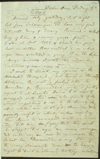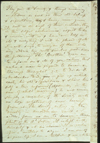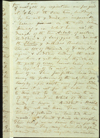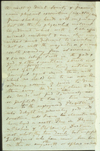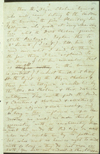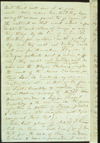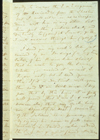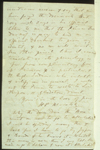Mahatma Letter No. 30: Difference between revisions
No edit summary |
(→Page 5) |
||
| Line 112: | Line 112: | ||
'''NOTES:''' | '''NOTES:''' | ||
* '''"I can't".''' These words were added by [[H. P. Blavatsky|H.P.B.]] to [[Morya|the Master]]'s dictation. | * '''"I can't".''' These words were added by [[H. P. Blavatsky|H.P.B.]] to [[Morya|the Master]]'s dictation. | ||
* '''Mahomed''' is a variation of Mohammed or Muhammed, the Prophet of [[Islam]]. | |||
{{Col-end}} | {{Col-end}} | ||
Revision as of 22:02, 8 March 2022
| Quick Facts | |
|---|---|
| People involved | |
| Written by: | H. P. Blavatsky/Morya |
| Received by: | A. P. Sinnett |
| Sent via: | unknown |
| Dates | |
| Written on: | unknown |
| Received on: | November 4, 1881 |
| Other dates: | unknown |
| Places | |
| Sent from: | Dehra Dûn |
| Received at: | Allahabad, India |
| Via: | unknown |
This is Letter No. 30 in The Mahatma Letters to A. P. Sinnett, 4th chronological edition. It corresponds to Letter No. 134 in Barker numbering. See below for Context and background. It is commonly called the "Prayag Letter" because it deals with the Prayāg Theosophical Society. Prayag is an ancient name for Allahabad.
Mahatma Letter No. 36 (which is misdated) should be read before Mahatma Letter No. 30.
< Prev letter chrono
Next letter chrono >
< Prev letter Barker
Next letter Barker >
Page 1 transcription, image, and notes
|
Dehra Dun. Friday. 4th. Arrived only yesterday, last night late from Saharampur. The house very good but cold, damp and dreary. Received a whole heap of letters and answer yours first. Saw at last M. and showed him your last or rather Benemadhab's on which you have scratched a query. It is the latter Morya answers. I wrote this under his dictation and now copy it. I wrote to Sinnett my opinion on the Allahabad theosophists. (Not through me though?) Adityarum B. wrote a foolish letter to Damodar and Benemadhab writes a foolish request to Mr. Sinnett. Because K.H. chose to correspond with two men, who proved of the utmost importance and use to the Society they all — whether wise or stupid, clever or dull, possibly useful or utterly useless — lay their claims to correspond with us directly — too. Tell him (you) that this must be stopped. For ages we never corresponded with anyone, nor do we mean to. What has Benemadhab or any other of the many claimants done to have a right to such a claim? Nothing whatever. |
NOTES:
|
Page 2
|
They join the Society, and though remaining as stubborn as ever in their old beliefs and superstitions, and having never given up caste or one single of their customs, they, in their selfish exclusiveness, expect to see and converse with us and have our help in all and everything. I will be pleased if Mr. Sinnett says, to everyone of those who may address him with similar pretensions the following: "The 'Brothers' desire me to inform one and all of you, natives, that unless a man is prepared to become a thorough theosophist i.e. to do as D. Mavalankar did, — give up entirely caste, his old superstitions and show himself a true reformer (especially in the case of child marriage) he will remain simply a member of the Society with no hope whatever of ever hearing from us. The Society, acting in this directly in accordance with our orders, forces no one to become a theosophist of the IId. Section. It is left with himself and at his choice. It is useless for a member to argue 'I am one of a pure life, I am a teetotaller and an abstainer |
NOTES:
|
Page 3
|
from meat and vice. All my aspirations are for good etc.' and he, at the same time, building by his acts and deeds an impassable barrier on the road between himself and us. What have we, the disciples of the true Arhats, of esoteric Buddhism and of Sang-gyas to do with the Shasters and Orthodox Brahmanism? There are 100 of thousands of Fakirs, Sannyasis and Sadhus leading the most pure lives, and yet being as they are, on the path of error, never having had an opportunity to meet, see or even hear of us. Their forefathers have driven away the followers of the only true philosophy upon earth away from India and now, it is not for the latter to come to them but to them to come to us if they want us. Which of them is ready to become a Buddhist, a Nastika as they call us? None. Those who have believed and followed us have had their reward. Mr. Sinnett and Hume are exceptions. Their beliefs are no barrier to us for they have none. They may have bad influences around them, bad magnetic emanations |
NOTES: |
Page 4
|
the result of drink, Society and promiscuous physical associations (resulting even from shaking hands with impure men) but all this is physical and material impediments which with a little effort we could counteract and even clear away without much detriment to ourselves. Not so with the magnetism and invisible results proceeding from erroneous and sincere beliefs. Faith in the Gods and God, and other superstitions attracts millions of foreign influences, living entities and powerful agents around them, with which we would have to use more than ordinary exercise of power to drive them away. We do not choose to do so. We do not find it either necessary or profitable to lose our time waging war to the unprogressed Planetaries who delight in personating gods and sometimes well known characters who have lived on earth. There are Dhyan-Chohans and "Chohans of Darkness," not what they term devils but imperfect "Intelligences" who have never been born on this or any other earth or sphere no more |
NOTES: |
Page 5
|
than the "Dhyan Chohans" have and who will never belong to the "builders of the Universe," the pure Planetary Intelligences, who preside at every Manvantara while the Dark Chohans preside at the Pralayas. Explain this to Mr. Sinnett (I can't) — tell him to read over what I said to them in the few things I have explained to Mr. Hume; and let him remember that as all in this universe is contrast (I cannot translate it better) so the light of the Dhyan Chohans and their pure intelligence is contrasted by the "Ma-Mo Chohans" — and their destructive intelligence. These are the gods the Hindus and Christians and Mahomed and all others of bigoted religions and sects worship; and so long as their influence is upon their devotees we would no more think of associating with or counteracting them in their work than we do the Red-Caps on earth whose evil results we try to palliate but whose work we have no right to meddle with so long as they do not cross our path. (You will not understand this, I suppose. |
NOTES:
|
Page 6
|
But think well over it and you will. M. means here, that they have no right or even power to go against the natural or that work which is prescribed to each class of beings or existing things by the law of nature. The Brothers, for instance could prolong life but they could not destroy death, not even for themselves. They can to a degree palliate evil and relieve suffering; they could not destroy evil. No more can the Dhyan Chohans impede the work of the Mamo Chohans, for their Law is darkness, ignorance, destruction etc., as that of the former is Light, knowledge and creation. The Dhyan Chohans answer to Buddh, Divine Wisdom and Life in blissful knowledge, and the Ma-mos are the personification in nature of Shiva, Jehovah and other invented monsters with Ignorance at their tail). The last phrase of M.'s I translate is thus. "Tell him (you) then that for the sake of those who desire to learn and have information, I am ready |
NOTES: |
Page 7
|
to answer the 2 or 3 enquiries of Benimadhab from the Shasters, but I will enter in no correspondence with him or any other. Let him put their questions clearly and distinctly to (you) Mr. Sinnett, and then I will answer through him (you)." ------- I send you my uncle's letter just received by me. He says (as my translation of his Russian letter shows) that he wrote to you the same. Whether you received it or not, I know not, but I send you this. If it is identical with yours then send me back mine. I suppose that by this time it is pretty well proved that I am I — and not someone else; that my uncle being now adjunct (or asst.) Minister of the Interior, is a personage who by signing his name in full can certainly be trusted, unless, indeed, the C. and M. and your friend Primrose |
NOTES:
|
Page 8
|
invent a new version and say that we have forged the documents. But my uncle says in his official letter to me that the Prince Dondoukof is going to send me an official document to prove my identity, and so we will wait. His other private letter I cannot translate as its phraseology is far from complimentary for Mr. Primrose in particular, and the Anglo-Indians who insult and vilify me in general. I will ask the Prince to write to Lord Ripon, or Gladstone direct. Your's in the love of Jesus Why the deuce does the "Boss" want me now to go to Allahabad? I can't be spending money there and back for I have to go by Jeypur and Baroda and he knows it. What all this means is more than I can tell. He made me go to Lahore and now it's Allahabad!! |
|
NOTES: |
Context and background
This is a letter from H. P. Blavatsky, dated at Dehra Dun. She had left Simla and was traveling about northern India. The letter incorporates, at Master M.'s dictation, a letter in reply to one from Sinnett, who also had left Simla for his home in Allahabad. The sentence "I wrote to Sinnett my opinion on the Allahabad theosophists" probably refers to the Mahatma Letter No. 36, which seems to have been misdated in the chronological edition of the letters.
Physical description of letter
The original is in the British Library, Folio 3. George Linton and Virginia Hanson wrote of this letter,
HPB to APS, on both sides of two folded sheets, in black ink, the major portion seemingly dictated by M.[2]
Publication history
Commentary about this letter
Boris de Zirkoff wrote a letter to The Theosophical Journal taking issue with an article in the November-December, 1964 issue that imputed bad faith to HPB with respect to this Mahatma Letter:
This [Mahatma] letter has been mentioned quite a number of times in Theosophical periodicals of the last few years, more particularly in the last couple of years, it would seem. It acts as the proverbial thorn in the thigh of a great many Theosophists.
The facsimile of this letter is before me. It is written in the ordinary handwriting of H.P.B. and is dated from Dehra Dûn, Friday, 4th, which stands for November 4th, 1881, when H.P.B. was in that locality.
She plainly says that she at last saw Master M.; that she showed him a letter from Benemadhab on which Sinnett had scratched a query; that Master M. answered that query; that she wrote his answer under his dictation and now copies it. No special mystery seems to be attached to these statements...
Letter No. 134 [Barker numbering system], with the message embodied in it, cuts at the very root of all ritualism, ceremonialism and priestcraft, and re-states in a somewhat modified language the fundamental principle of the Esoteric Philosophy in regard to the utter impersonality of the Divine. In an Organization in which the reactionary spirit of the Brâhmans almost overwhelmed even the devoted Olcott himself some years ago, and in which the sacerdotal influence of the Liberal Catholic Church plays today such enormous influence, Letter No. 134 is and will remain a thorn in the side, to be extracted, if possible, from the Codex of Theosophical writings. I doubt whether this can ever succeed.
In the meantime, why not take the ideas embodied in this message and discuss them openly and frankly for all men to see![3]
Notes
- ↑ George E. Linton and Virginia Hanson, eds., Readers Guide to The Mahatma Letters to A. P. Sinnett (Adyar, Chennai, India: Theosophical Publishing House, 1972), 80.
- ↑ George E. Linton and Virginia Hanson, eds., Readers Guide to The Mahatma Letters to A. P. Sinnett (Adyar, Chennai, India: Theosophical Publishing House, 1972), 79.
- ↑ Boris de Zirkoff let to the editor of The Theosophical Journal. January 17, 1965 [date mailed]. Theosophical Society in England correspondence. Boris de Zirkoff Papers. Records Series 22. Theosophical Society in America Archives.
